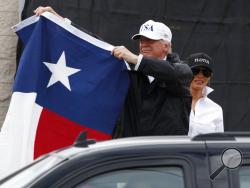CORPUS CHRISTI, Texas (AP) — President Donald Trump answered Harvey's wrath by offering in-person assurances to those in the storm zone that his administration will work tirelessly to help the region recover from the massive flooding and storm-inflicted destruction.
"We are going to get you back and operating immediately," Trump told an impromptu crowd that gathered outside a Corpus Christi fire station about 30 miles from where the storm made landfall Friday.
The president kept his distance from the epicenter of the damage in Houston to avoid disrupting recovery operations. But he plans to return to the region Saturday to survey the damage and meet with some of the storm's victims, said Press Secretary Sarah Huckabee Sanders.
Trump will change his focus Wednesday with a trip to Springfield, Missouri to kick off his lobbying effort for a tax overhaul. He will offer some broad goals, but few specifics,
During his Texas trip, Trump was eager to get the federal disaster response right, but he missed clear opportunities to strike a sympathetic note for multitudes who are suffering. The president did not mention those who died in the storm or those forced from their homes by its floodwaters. And he basked in the attention of cheering supporters outside the fire station where officials briefed him on the recovery.
"What a crowd, what a turnout," Trump declared before waving a Texas flag from atop a step ladder positioned between two fire trucks. "This is historic. It's epic what happened, but you know what, it happened in Texas, and Texas can handle anything."
Trump is clearly determined to seize the moment and show a forceful response to Harvey, mindful of the political opportunities and risks that natural disasters pose for any president. Trump has been suffering from low approval ratings and self-created crises, and the White House is eager to show him as a forceful leader in a time of trouble.
What little damage Trump saw — boarded-up windows, downed tree limbs and fences askew — was through the tinted windows of his SUV as his motorcade ferried him from the Corpus Christi airport to the firehouse in a city that's already nearly back to normal.
Trump spoke optimistically about the pace of the recovery, and predicted his response would be a textbook case for future presidents.
Then it was on to his next stop, Austin, to meet with officials at the state emergency operations center.
Texas Gov. Greg Abbott said Trump showed "genuine compassion" on the short flight to Austin as they watched video footage of the flooding in Houston. "The president was heartbroken by what he saw," the governor said.
But Ari Fleischer, who served as press secretary to former President George W. Bush, said there was something missing from Trump's remarks in Corpus Christi: "empathy for the people who suffer."
"The first thing he should have said was that his heart goes out to those people in Houston who are going through this, and that the government is here to help them recover," Fleischer told Fox News Channel.
It's long been presidential practice to avoid visiting the most devastated areas of a natural disaster while recovery is still in the early stages, to avoid getting in the way or diverting critical resources. In Texas, residents seemed to understand.
Before Trump landed in Texas, Louis Sirianni arrived at his beach house in Rockport, about 20 miles outside Corpus Christi, to assess damage. Sirianni said he appreciated Trump's gesture and understood why there were no plans to take him into the hardest-hit area.
"He'd see enough if he came along here in a helicopter," Sirianni said on a balcony accessible only by a 12-foot aluminum extension ladder.
Trump, wearing a black rain slicker emblazoned with a presidential seal, traveled with first lady Melania Trump and Cabinet secretaries who will play key roles in the recovery. Mrs. Trump wore a black cap that read "FLOTUS," an acronym for "first lady of the United States."
The president, during his stop in Austin, said it was a "sad thing" that the recovery would be a "long-term" operation.
His largely upbeat reassurances about a speedy recovery, though, stood in contrast to the more measured assessments coming from emergency management officials. There's a long, difficult road ahead in recovering from a storm whose flooding has displaced tens of thousands, those officials have cautioned.
And the president's vow of swift action on billions of dollars in disaster aid is at odds with his proposed budget, which would eliminate the program that helps Americans without flood insurance rebuild their homes and cuts grants to help states reduce the risk of flooding before disaster strikes.
While Trump's pending budget request didn't touch the core disaster aid account, it proposed cutting several grant programs that help states reduce flood risks before a disaster strikes and improve outdated flood maps.
All told, Trump proposed cutting such grant programs by about $900 million. Former Democratic President Barack Obama also cast a skeptical eye, proposing cuts roughly two-thirds as large as Trump in his final FEMA budget.
___
By KEN THOMAS and DARLENE SUPERVILLE, Associated Press
___
Superville reported from Washington. Associated Press writers Jill Colvin and Andrew B. Taylor in Washington and Kelly P. Kissel in Rockport, Texas, contributed to this report.
__
On Twitter follow Ken Thomas at https://twitter.com/KThomasDC and
Darlene Superville at https://twitter.com/dsupervilleAP
___
For complete Harvey coverage, visit https://apnews.com/tag/HurricaneHarvey

